A nice short interview for an Italian conference (but it is in English). For me the most interesting question was at the end about why aren’t we all just information scientists.
Beyond the Bullet Points: Bad Libraries Build Collections, Good Libraries Build Services, Great Libraries Build Communities
Here is the tweet that led to this post:
“Bad Libraries build collections. Good libraries build services (of which a collection is only one). Great libraries build Communities”
Due to character limits it was often re-tweed without the parenthetical:
“Bad Libraries build collections. Good libraries build services. Great libraries build Communities”
Let’s face it, this is snappier, but it is also apparently more controversial. There were a number of responses along the line that good and great libraries must build collections too. I thought it was worth more than 140 characters to add some nuance and depth to the tweet, so here we are.
Before I jump all the way in here…if you are an auditory or visual type, I made a lot fo these points in this screencast:
https://davidlankes.org/rdlankes/blog/?p=1406
Now, back to the tweet.
First, there is nothing that says that good and great libraries don’t or can’t build collections. It is a matter of focus. If librarians focus solely or disproportionately on the collection, that is bad. This shows up in a couple of ways. The first is obvious: acquisitions with little or no input from members of the community. Are you adding to a collection because of what is on the New York Times bestsellers, or that’s what the jobber sends? Bad. If you aren’t looking at circulations data, having conversations with the community, or looking at ILL data: bad.
I am reminded of this in the current debate around ebooks. There is a lot of talk about whether libraries should be buying ebooks at all. Someone asked me what I thought and I said that tactically librarians should build their own ebook platform that brings a lot of value to authors, and; two, ask your community. If you are planning on boycotting or simply staying out of ebooks, have you had that conversation with the communities? Does the community think it is a bad deal what the publishers are proposing? Are they ok with not having that as a library service? Note this is not simply asking meekly, but truly having a conversation where you are presenting an argument and showing the community the big picture and then listening.
If we are talking focus, what is the difference between bad libraries and good ones? Good libraries focus on users. That is they evaluate the utility of the collection is relation to user needs. What do people want and need in terms of the collection, and how does that balance with all the other things the library does (reference, programming, digital resources, instruction, etc.). Here not only do we look at user data such as circulation and such, but the whole user experience.
There was once a debate among the faculty here at Syracuse about where we should teach collection development. It was (and is) part of a class title “Library Planning, Marketing, and Assessment.” The instructor at the time didn’t like it there. How do weeding and marketing go together? Well, it turns out the questions you ask about the collection are like any other service: what are the objectives? How is it used? Is it easy to access (and assess)? The collection is a service like any other – it needs budgeting, planning, and a reason to exist.
Good libraries understand that any time you add value to a user experience you are proving a service. Shelving? Service. Cataloging? Service. Weeding? Service (to save the user time and eliminate rapid access to out of date information). I know all of these things are wrapped up as “collection,” but by breaking them apart you can better evaluate them, and better accomplish them.
I pick the term “user” carefully in this part of the discussion, because I believe it is what separates good from great. You see a good library sees the collection as a service and therefore monitors and plans for its use. A great library sees the collection as only a tool to push a community forward, and more than that, they see the library itself as a platform for the community to produce as well as consume. The library member co-owns the collection and all the other services offered by the librarians. The library services are part of a larger knowledge “eco-system” where members are consuming information yes (a user), but also producing, working, dreaming, and playing. That is the focus of a great library. They understand that the materials a library houses and acquires is not the true collection of a library – the community is.
So, do good, bad, great, and ugly libraries have collections? Yes. But great libraries realize that the collection is not what sits on the stacks, but the members and their worlds. The focus is on connection development, not collection development. Will there be collections developed? Probably, but that collection may be of links, digital scans, books, building materials, video production equipment, performance time on a stage, and/or experts.
This is clear in the discussion around school libraries. As districts around the country are eliminating school librarians they often cite that the hours of the library won’t go down. “We can keep the doors open with library aids, or existing staff in the building.” They ignore the data that shows that it is certified school librarians, not open hours, or the collection, that improves test scores and student retention. Librarians not libraries make the difference.
Once again, does the school librarian use a collection? Certainly, but great school librarians have a collections of lessons they teach, student teams that assist teachers with technology, and collections of good pedagogy. Want to save money in a school? Close the library and hire more school librarians.
This tweet is not a call to throw out collections of materials – there is great value there – but to change focus and realize that that value comes not from the artifacts, but the community’s ability to improve. That value may come from licensed databases in academia. It may come from shipping containers full of paper books in rural Africa. It may come from genealogy materials in the public library, or special collections in the Ivy League. But for some communities it may come from the rich array of open resources accessible via any smartphone, or, increasingly, artifacts, ideas, and services created by the community itself.
Great libraries can have great buildings, or lousy buildings, or no buildings at all. Great libraries can have millions of volumes, or none. But great libraries always have great librarians who engage the community and seek to identify and help fulfill the aspirations of that community.
Expect More
“Expect More” Hunters and Gatherers: Reshaping College Libraries for the 21st Century, Syracuse, NY.
Slides: https://davidlankes.org/rdlankes/Presentations/2012/OCC.pdf
Audio: https://davidlankes.org/rdlankes/pod/2012/OCC.mp3
Screencast:
Duct Tape, 3D Printing, and Libraries of the Future
A few weeks back I took my sons to the Fayetteville Free Library to learn more about their new Fab Lab and see the 3D MakerBot printer in action. While we were busy printing out a robot and ring on the 3D printer, the librarian (Lauren) mentioned an upcoming open house for the Fab Lab that would include the 3D printer, making jewelry, and making things in Duct Tape…if she could find someone who made things with Duct Tape. Riley, my 11 year old said “I make stuff with Duct Tape,” and before Lauren knew what was happening he was flipping though pictures of his creations on his phone.
“Great” said Lauren without missing a beat “you could teach it.” And he did.
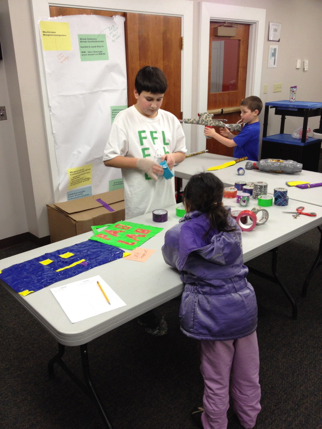
You should have seen him beam when Sue Considine, the amazing director of Fayetteville Free, personally thanked him for helping out.
A week later my youngest son said he had a great idea for this year’s science fair. “I’m going to design the library of the future!” he declared. Within 10 minutes he had sketched it out on paper.
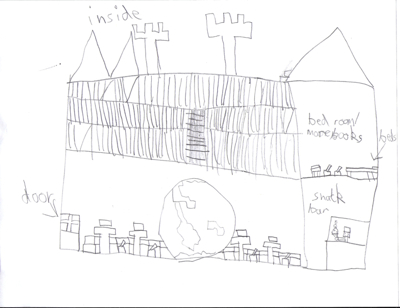
20 minutes after that he and his brother were building the library in Minecraft, a popular game akin to SecondLife, or SimCity. Sure they could build it in Legos (Andrew later did), but Legos don’t have working roller-coasters and you can’t invite your friends from around the world to walk through it (there are as I write this over 23 million registered Minecraft users).
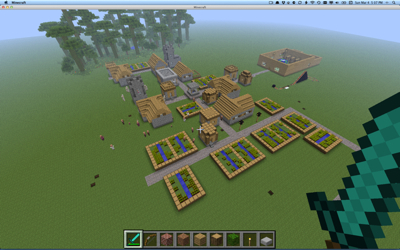
The next Saturday we took the “library” on a disk back to Fayetteville and printed it out.
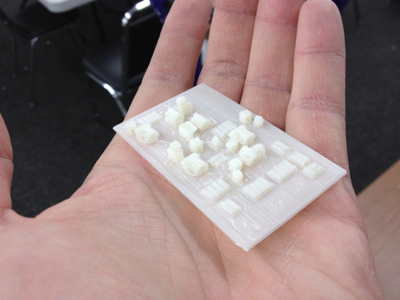
Now you might think this is the point when I to talk about millennials, or the power of Fab Labs (I don’t buy the millennial argument and I hope you know I LOVE the Maker Space in the library concept). But that’s not what sticks out to me about this story. What sticks out to me is the motivations my sons had, and how that was encouraged by the librarian. Sure the 3D printing was cool, but that’s not what hooked Riley. What hooked him was when Lauren asked him to teach the duct tape class. What got him hooked was when he came into the Fab Lab two weeks later and saw that the librarians had hung his duct tape Fab Lab sign on the door. What got Andrew hooked was sitting in front of the maker bot while it printed during the open house and got to explain how it worked, and what it was printing.
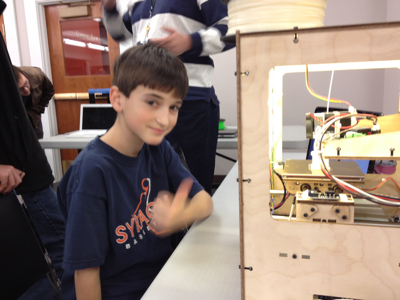
Recently – as our LIS students are hearing about participation, reading the Atlas of New Librarianship, following the Library of the People as part of Occupy Wall Street – they have been stopping by faculty offices and asking why we teach what we do, and forming their own lecture series to fill in the gaps they perceive in their preparations. They have reached out to the Hack Library School blog, and have been doing a pretty good job of usurping the school-wide tech blog. They want to know when we talk about the value and power of librarians regardless of institution, why they are being taught to only work in one type of institution. They want to know why curriculum only gets overhauled every 10 years. They are holding the faculty to account in ways as never before. To paraphrase the famous line – the students are revolting…and I think I like it.
And in the midst of this, the faculty are looking for new models. One that is of frequent conversation is the “flipped classroom.” The one where “students do homework in class and classwork at home.” The one where students do project based work in the class and listen to the lectures online. So in the middle of this discussion – in the middle of 3D printing – in the middle of student run symposia – it hits me. I apologize to all who find this obvious, and I could probably have said these words before, but it really hit home for me:
While we sit here and debate when we deliver our lectures, or how long they are, or in what channels; the real flip is already occurring. The lecture? The long form or short form, oratory? That is not the point of this. They all have a place. No, the real flip is faculty are losing control. The real flip is from us – LIS faculty – thinking we have the content and we are just debating the delivery to the truth that we need to relearn the content continuously right along side our students.
That last bit, the relearning bit, that is crucial. This is not simply ceding control, or turning education into one long do it yourself project. There is value in a good teacher and a good researcher – they will always have a strong ability to guide. No, it is about realizing that truly co-owning a curriculum, or library program, requires constant reinvention if for nothing else than applying it to new contexts. It is why the university model of researcher/teacher has worked so well for so long…it is in the disconnection of these two things that we run into breakdowns.
The same is true of our libraries. The Maker Space concept does not work unless all are involved – librarians, members, experts, children, parents – understand that they are all learning at the same time. If a kid shows up and is trained and treated as a consumer, the Maker Space will fail. No $2,000 MakerBot can match the quality of a store bought lego or toy. No, the trick is to show the child, or parent, or member, that they are part of a learning process and discovering something new – if only it is new to them. They have to be in on the truth that we are all just figuring this out as we go. And if we have it all figured out? Time to try something new.
I know there are long discussions to be had about the role of experts, the value of experience, and pedagogy of well known and new areas. I get that. I know I am oversimplifying here, but that is kind of the point. Those discussion of expertise and pedagogy need to be just that – discussions – conversations. They are messy, and there is a huge amount of ego riding on them. And yet, if we don’t open those conversations up beyond the faculty – beyond the librarians, then we have shut down a most remarkable opportunity for motivation and student/member involvement. And if we shut down conversation we have failed in our mission.
Atlas Acknowledgements
As I announced, the Atlas of New Librarianship has received the 2012 ABC-CLIO/Greenwood Award for the Best Book in Library Literature. While I have been extremely grateful for the notes of congratulations, I cannot take all the credit. While the Atlas has my name on the front cover, it would not have been possible without the contributions and support of a lot of remarkable people. I put this list in the book, but it is always worth repeating (and augmenting a bit):
Atlas Research Team
This is the crew that did the heavy lifting on the Atlas manuscript through editing, reviewing, arguing, and generally getting it done. Todd Marshall, Angela Usha Ramnarine-Rieks, Heather Margaret Highfield, Jessica R. O’Toole, and Xiaoou Cheng. Special thanks to Julie Strong for her help.
Agreement Researchers
One of the advantages of being in an innovative school like Syracuse University’s iSchool is that every so often I get to make classes up. So I did. The students did a fantastic job of slogging through rough drafts of the threads and doing a lot of really amazing work on the agreements and discussion questions.
Jocelyn Clark, Amy Edick, Elizabeth Gall, Nancy Lara-Grimaldi, Michael Luther, Kelly Menzel, Andrea Phelps, Jennifer Recht, Sarah Schmidt, and William Zayac.
Participatory Networks White Paper
The work in this Atlas really began with the formation of participatory librarianship. That happened because Rick Weingarten and Carrie McGuire of the American Library Association’s Office for Information and Technology Policy (OITP) commissioned a white paper on social networking in libraries. Much of the foundational work on these concepts came from long hours of conversation between my co-authors, Joanne Silverstein and Scott Nicholson.
From the white paper on, OITP has been a great support in the work. I thank them and all the folks at ALA’s Washington Office: Emily Sheketoff, Rick Weingarten, Carrie McGuire, and Alan Inouye.
Starter Kit Sites
Most of the examples and experiments throughout the Atlas come from a wide variety of library and information settings. The following folks were gracious enough to open their doors for me and share their insights.
Blane Dessy and the librarians of the Department of Justice Law Libraries.
Linda Johnson and Sandra Horrocks of the Free Library of Philadelphia Foundation, and Elliot Shelkrot, Joe McPeak, Kyle Smith, and all of the great librarians (past and present) of the Free Library.
Jeff Penka, Susan McGlamery, Paula Rumbaugh, and Tam Dalrymple of OCLC’s QuestionPoint service.
Robert Johnston and the librarians of LeMoyne College.
Elizabeth Stephens of the Glendale Library.
Participatory Librarianship Research Group
After the white paper was out, a group of talented faculty and doctoral and master’s students worked with me to further refine the ideas now in this Atlas: Todd Marshall, Angela Usha Ramnarine-Rieks, Joanne Silverstein, Jaime Snyder, Keisuke Inoue, David Pimentel, Gabrielle Gosselin, Agnes Imecs, and Sarah Webb.
Special thanks to Meg Backus for her ideas on innovation.
MIT Press
Marguerite Avery, Senior Acquisitions Editor, for giving the book a chance.
ACRL
Kathryn Deiss, for insisting that I had to publish with ACRL, and Mary Ellen Davis, who told me I was allowed to piss off anyone I needed to.
The ILEADU Team, the State Library of Illinois, and IMLS
Thanks to Anne Craig, Gwen Harrison, and all the folks involved with the ILEADU Project for giving me a chance to try out some of these ideas.
A special thank you to Mary Chute of IMLS for her reaction and support. Her leadership has pushed the field forward.
The John D. and Catherine T. Mac Arthur Foundation
Thanks to Kathy Im and Elspeth Revere for supporting a study on the future of libraries and the development of the Reference Extract Idea. It is a rare treat to find funders who are great collaborators and ask the best questions. Also thanks to Connie Yowell for support on my credibility work.
Reference Extract is very much a product of brilliant collaborators like Jeff Penka, Mike Eisenberg, Eric Miller, and Uche Ogbuji.
Ideas and Reactions
I do practice what I preach. Most of my learning happens in conversations over lunch, coffee, and in hallways. What I love about the field of librarianship is that you are never at a loss for interesting company. I am going to miss a lot of people in making this list, but I wanted to give a shout out to some of the folks who had patience with me droning on about new librarianship.
Scott Nicholson, Joanne Silverstein, Meg Backus for the brilliant concepts on innovation versus entrepreneurship, Joe Janes, Eli Neiburger, Jill Hurst-Wahl, Mary Ghikas, George Needham, Chuck McClure, Michael Eisenberg, Joe Ryan, Megan Oakleaf, Blythe Bennett (who cemented the name for the Atlas), and Buffy Hamilton.
An apology to those I forgot.
General Acknowledgments
Thanks to my family, who had to see a lot of my back while I was typing in my office. Riley, I marvel every day at the man you are becoming. Andrew, you are the epitome of infectious joy. Anna Maria, my wife and love of my life, you make me a better man and the world a better place.
Thanks to all of the audiences of my presentations. Your questions, comments, and challenges honed these ideas. What’s more, they demonstrated that the best days of librarianship are ahead of us.
Thanks to the University of North Carolina, Greensboro, for the time to write this book.
Thanks to the Free Library of Fayetteville for the place to write. I can’t tell you the number of tough fixes I worked through on the Stickley furniture.
To Ray von Dran, who taught me true mentorship. He gave me my first real job, his trust, and faith. His time on Earth was too short, but his impact was great.
To my dad, who taught me that everything is retail. Whether you’re selling ink or ideas, you still have to sell. I miss him every day.
To my mom, who has every one of my books and may well be the only one to have read them all (including me).
To Michael Eisenberg, my one-time advisor, but always mentor and friend.
To Chuck McClure, who has shown me that staying on the top of your game throughout your career is possible.
To Joan Laskowski, my real boss.
To Lisa Pawlewicz for all her hard work in helping me play with technology.
To Marie Radford, who covered for my Atlas obsession on that other book.
To Liz Liddy who is the queen of encouragement and for her addiction to innovation.
Thanks to the creators of Galcon who gave me the perfect activity to think things through (well technically, take a break from thinking things through). And damn you Plants vs. Zombies for that lost week!
Librarians Who Have and Continue to Inspire Me
Abby Kaswowitz-Schear, Blythe Bennett, Joann Wasik, Pauline Shostack, Holly Sammons, Rivkah Sass, Sari Feldman, Stewart Bodner, Stephen Bell, Stephen Francoeur, Donna Dinberg (who is no doubt whipping Heaven’s reference desk into shape as we speak), Franceen Gaudet, Joe Janes, Nicolette Sosulski (a one-woman reference SWAT team), Jenny Levine, Karen Schneider, Joan Stahl, John Collins, Linda Arret, Nancy Morgan, Melanie Gardner, Joe Thompson, Buff Hirko, Caleb Tucker-Raymond, Nancy Huling, Jane Janis, Joyce Ray, Bob Martin, Tasha Cooper, Mary Chute, Keith Stubbs (although you may not have the degree, you have the brain, heart, and soul of a librarian), Joe Ryan (the first and second), Linda Smith, Pauline Nicholas, Kathleen Kerns, Meg Backus, Mary Fran Floreck, Kate McCaffrey, and Lorri Mon.
Barbara Stripling for ALA President
I have had the privilege of working with Barbara Stripling on projects likes KidsConnect, as a member of her dissertation committee, and now as a fellow faculty member. In all of those encounters I have been impressed by her thoughtfulness, dedication to the profession, and ability to lead. That is why I want to encourage my readers to vote for her to be the next ALA president.
Barbara sees deeply into issues and is dedicated to brining positive transformation to our profession and the communities we serve. She has shown a near superhuman ability to navigate a politically charged city government in her role as Director of School Library Services in New York City. She has shown an aptitude for scholarly research that is a welcome addition to my university. She has an unwavering passion for children and the role of school libraries in K-12 education.
I can think of no one better suited to head ALA. Please join me in supporting Barbara.
Visit Barbara’s Website: http://www.barbarastripling.org/
Twitter Digest for 2012-02-22
- Twitter Digest for 2012-02-15: Twitter Digest for 2012-02-14: Twitter Digest for 2012-02-13: Twitter Digest for … http://t.co/S0UdGJMG ->
- RT @librarianwilk: Elsevier has a right to charge what it can get away with. It doesn’t have a right to lie and defraud us. http://t.co/ … ->
- RT @FakeLibStats: Dewey Decimal System was meant to be a tool for good; putting 12 digits after the decimal is just a way to confuse people ->
- RT @TheLiB: If you’re a librarian, you don’t want to be logged in to Google when you’re doing searches for your users. Here’s why. http: … ->
- very thoughtful piece on ebooks and the publishing ecosystem: http://t.co/S4LV0hZb ->
- RT @iSchoolSU: An Interview with iSchool Alum Erin Dorney on Librarianship | New on #InfoSpace: http://t.co/oml17MSY ->
- RT @MiaBreitkopf: Why d’you need your own website? Read http://t.co/GHQ2U5Tv & join me for Lankes+http://t.co/OSFxczZM! 12pm Tues 013 Hi … ->
- Looks like a trip to the Netherlands this August – yea! ->
- For those in LIS considering an Elsevier boycott here’s a list of area journals: http://t.co/rMYQRYFs ->
- Introducing children to Monty Python’s Holy Grail. They may miss about 95% of it. They liked the Black Knight scene. ->
- RT @buffyjhamilton: Embedded Librarianship: Tools and Practices – Books / Professional Development http://t.co/NGYd9P7t My new report … ->
- RT @barbstripling: I’m excited to be doing a virtual / f2f town hall with academic librarians next Mon (2/27). It’ll be on my website h … ->
- RT @candyschwartz: love it RT @leonnea: Pour toi: Gandalf teacher’s stamp is the classiest way to fail students and/or Balrogs – http:// … ->
- RT @eysenbach: “In the internet age, Elsevier is doing an unbelievably shitty job of accomplishing its ONE AND ONLY PURPOSE” http://t.co … ->
- RT @jill_hw: Little Libraries Sprout Across the Country, http://t.co/ZLgZgQdo <- Mentions the little library project in Syracuse! #sy … ->
- Yes! http://t.co/ECSrrFRo ->
- This looks interesting “Youth and Digital Media: From Credibility to Information Quality” http://t.co/oDGyVo2Y ->
- RT @barbstripling: Minneapolis Pub Lib hosts a Wikipedia edit-a-thon to clean up entries on Minneapolis history. http://t.co/IBzvASRS ->
- #511fall Great advice for job interviewers: http://t.co/9w95d8xx ->
- RT @jpom: “Public libraries will have tremendous value and support… as community publishers” @digpublib http://t.co/iGyuaWfR #inls740 ->
- RT @jdross: 61 Tech Geek Jobs for LIS Grads (and others) – http://t.co/JwUZjW8M ->
- @Flynnglish how about via phone wed? in reply to Flynnglish ->
- RT @scalzi: Why I try not to argue on Twitter: Stupidity is almost always tweet-length. Reasonable rational responses? Usually not so much. ->
- RT @rtennant: “Are You a Librarian Superhero?” http://t.co/QBUnIiVf ->
- RT @jill_hw: @barbstripling vision: transform ALA, transform libraries, transform communities #barb4ala ->
- Atlas Wins Award 2012 ABC-CLIO/Greenwood Award for the Best Book in Library Literature: Immediate Release Mon, 0… http://t.co/RZDw2msk ->
- RT @kdeiss: Congrats to @rdlankes on winning ABC-CLIO/Greenwood Press Award! So proud to be co-publisher with MIT Press! http://t.co/RwW … ->
- @librarianwilk thanks! in reply to librarianwilk ->
- @ABC_CLIO Many many thanks for supporting the award and the profession! in reply to ABC_CLIO ->
- @mmsubram thank you. in reply to mmsubram ->
Atlas Wins Award 2012 ABC-CLIO/Greenwood Award for the Best Book in Library Literature
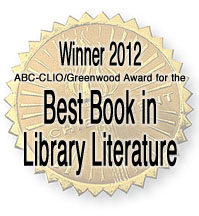 Immediate Release
Immediate Release
Mon, 02/27/2012 – 09:48
Contact: Cheryl Malden
CHICAGO – “The Atlas of New Librarianship” by R. David Lankes has been named the winner of the 2012 ABC-CLIO/Greenwood Award for the Best Book in Library Literature. The award, which is given annually by the American Library Association, will be presented at the association’s Annual Meeting in Anaheim, Calif., in June.
The book was co-published by the Association of College & Research Libraries (ACRL), a division of ALA, and The MIT Press. In his book, Lankes articulates a new purpose for librarianship: “The mission of librarians is to improve society through facilitating knowledge creation in their communities.” He envisions a profession based not on books and artifacts but on knowledge and learning which are created through conversations. The innovatively structured text, graphics and accompanying website are designed to stimulate further conversation about the field of librarianship.
The Award Committee praised the book for its unique visual map of ideas and their relationships to theory and practice. One committee member declared, “It made me think critically about our profession and our future…. I was taken out of my comfort zone and that was a good thing.” Other members praised the Atlas as “challenging,” “complex,” and “exciting both in its ideas and its design.”
Describing the book as “rich in optimism,” Kathryn Deiss, ACRL content strategist, said that “The Atlas of New Librarianship” creates “a platform for vital conversations about the future of librarianship.” The book’s unusual format presents more than 140 Agreements (statements on aspects of librarianship) and visually represents the threads that connect key ideas.
R. David Lankes, PhD, is a professor at Syracuse University’s School of Information Studies and director of its library science program. He also directs the Information Institute of Syracuse (IIS), a research center and think tank. Lankes was the provocative speaker for the Midwinter Conversations at the ALA Midwinter Meeting in Dallas.
The members of the ABC-CLIO/Greenwood Award jury were: Chair, Susan E. Searing, Library & Information Science Librarian, University of Illinois at Urbana-Champaign; June L. DeWeese, head of access services, University of Missouri at Columbia; Jasmine Y. Posey, training services librarian, Greenwich (Conn.) Library; John C. Sandstrom, head of acquisitions, New Mexico State University; and William Newbold Schultz, Jr., catalog librarian, Appalachian State University.
About ACRL
ACRL is a division of the American Library Association (ALA), representing more than 12,000 academic and research librarians and interested individuals. ACRL is the only individual membership organization in North America that develops programs, products and services to meet the unique needs of academic and research librarians. Its initiatives enable the higher education community to understand the role that academic libraries play in the teaching, learning and research environments. ACRL is on the Web at http://www.acrl.org/, Facebook at http://www.facebook.com/ala.acrl and Twitter at @ala_acrl
About MIT Press
The MIT Press is the only university press in the United States whose list is based in science and technology. This does not mean that science and engineering are all we publish, but it does mean that we are committed to the edges and frontiers of the world–to exploring new fields and new modes of inquiry. We are a major publishing presence in fields as diverse as architecture, social theory, economics, cognitive science, and computational science, and we have a long-term commitment to both design excellence and the efficient and creative use of new technologies. Our goal is to create books and journals that are challenging, creative, attractive, and yet affordable to individual readers.
THE MIT PRESS | 55 Hayward Street | Cambridge, MA 02142
About “The Atlas of New Librarianship”
For more information about “The Atlas of New Librarianship,” visit http://www.newlibrarianship.org.
To purchase “The Atlas of New Librarianship” visit http://mitpress.mit.edu/catalog/item/default.asp?ttype=2&tid=12560
The ABC-CLIO/Greenwood Award for the Best Book in Library Literature Award will be presented at the ALA Award Ceremony and Reception, Sunday June 24 at the ALA Annual Conference in Anaheim, Calif.
More information about the ABC-CLIO/Greenwood Award for the Best Book in Library Literature including how to submit a nomination is available on the ALA website.
Twitter Digest for 2012-02-15
- Twitter Digest for 2012-02-14: Twitter Digest for 2012-02-13: Twitter Digest for 2012-02-12: Twitter Digest for … http://t.co/mF2DMq2n ->
- @jzamostny @askusnow @michaelkpate great job. And very frightening. in reply to jzamostny ->
- Twitter Digests: I have not been that active blogging these days, but I have been busy on Twitter. So I’m having… http://t.co/ETazHVFI ->
- @jzamostny @askusnow @michaelkpate No, but clearly publishers aren’t so worried. in reply to jzamostny ->
- “@librarianwilk: Reading denaturalized: http://t.co/8sOX8EeR” brilliant. ->
- RT @librarianwilk: Just in case you forgot how crazy EULAs can be. http://t.co/m1vm01aX ->
- @spkowalski I sent you an assessment/rubric idea. Think it could be fun to flesh out. in reply to spkowalski ->
- RT @kissane: This this this this. RT @kristastevens: “Those who cannot imagine the future are doomed to fuck it up” –Lauren Beukes #web … ->
- RT @buffyjhamilton: What’s Our Focus? Participatory Learning (and Libraries):Beyond the Unicorns, Fairies,&Happily Ever After http://t. … ->
- RT @millerlibrarian: Returning the Love http://t.co/U4nIeOjm #fb #in Do our users know this? ->
- RT @millerlibrarian: Create a Library “Tech Shop” http://t.co/oBviocjw #fb #in ->
- @jill_hw See this cool intel. property video? http://t.co/FYiu9pgw ->
- “@TheLiB: Oh mah lawd… “@ranti: Aw, snap! RT @captain_primate: “@courosa: “Best. Technical College. Ad. Ever.” http://t.co/FSHzGbJp Wow.”” ->
- RT @librarythingtim: Looking for legislator to introduce law to grant a (limited, reasonable) right for libraries to buy and rent ebooks … ->
- RT @mstephens7: @LibraryJournal Companion piece to new #officehours column here- http://t.co/NPKTHbTY Exploring curriculum w @rdlankes & … ->
- Look what I just printed at the Fayetteville Free Library’s FabLab! http://t.co/A0dWt0yf ->
- RT @webbmedia: Libraries should not rely on circulation and foot traffic alone to measure its effectiveness in a community. #Libraries ->
- RT @buffyjhamilton: Free Range Librarian › Between an ebook and a hard place | @scoopit http://t.co/942YFwyX one of the smartest posts I … ->
- RT @DonLinn: RT @GraemeGarden1: The new Kindle is great, and yet you can’t beat the look and the feel and the smell of a traditional old … ->
- RT @barbstripling: Provocative Tools of Change conference in NYC: Libraries, Tech-Smart Authors, & the Coming Digital Apocalypse 2/13-15 … ->
- @jill_hw @doroteaszkolar I could so take down a muppet! in reply to jill_hw ->
- Joining the Conversation: School Librarians as Facilitators of Learning: “Joining the Conversation: School Libra… http://t.co/c5H1oyOJ ->
- RT @DavidBendekovic: “Best workshop of my life.” Don’t miss the @LibraryJournal new event series Lead the Change http://t.co/OePrUcmn #LJLTC ->
- @tichwi Many thanks. in reply to tichwi ->
- Nice piece on the Fayetteville Free Library’s FabLab: http://t.co/nIkBh83F ->
- I finally beat my mother at words with friends. I also have some issues if I had to post this fact. Paging Dr. Freud. ->
- RT @TheLiB: Mr. @wawoodworth on eBooks: “I’d like to see less complacency & more agitation when it comes to our current practices.” http … ->
Joining the Conversation: School Librarians as Facilitators of Learning
“Joining the Conversation: School Librarians as Facilitators of Learning.” Lankes, R. D. (February, 2012). 39(3). Teacher|Librarian pps. 8-12.
 http://goo.gl/jNLNy
http://goo.gl/jNLNy
